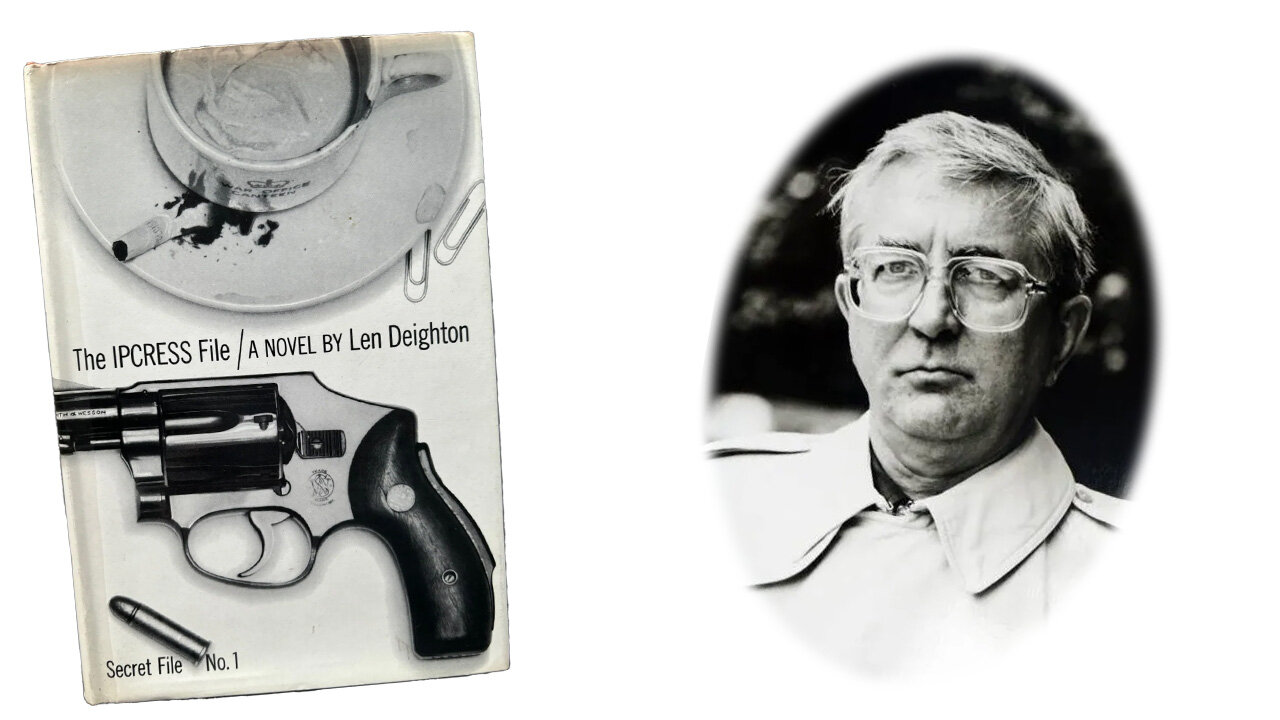Premium Only Content

'The Ipcress File' (1962) by Len Deighton
Len Deighton’s 'The Ipcress File', first published in 1962, stands as a landmark in Cold War spy fiction. It marked not only Deighton’s literary debut but also a significant shift in the genre itself—away from the glamorous world of Ian Fleming’s James Bond, and toward a grittier, more cynical view of espionage rooted in bureaucracy, moral ambiguity, and psychological gamesmanship. This novel introduced readers to a nameless intelligence officer—later known as Harry Palmer in film adaptations—who operates in the shadowy, disjointed world of British intelligence during the height of East-West tensions. With its sardonic tone, labyrinthine plot, and keen eye for detail, 'The Ipcress File' redefined what a spy novel could be.
At the heart of the novel is the investigation into a series of high-profile kidnappings of British scientists, culminating in the discovery of a sinister brainwashing program codenamed "IPCRESS" (Induction of Psycho-neuroses by Conditioned Reflex under Stress). The protagonist, our unnamed narrator, is transferred from military intelligence to a smaller, civilian branch known as WOOC(P), where he is charged with investigating these disappearances. What follows is a spiraling series of deceptions, double-crosses, and psychological manipulations, as the narrator navigates not only the criminal underworld but also the treacherous corridors of his own organization.
Unlike the suave, upper-class agents of traditional spy fiction, Deighton's protagonist is working-class, cynical, and fiercely intelligent. He cooks gourmet meals, distrusts authority, and treats the bureaucracy of intelligence work with barely concealed disdain. His perspective is shaped by a weary realism, one that reflects the disillusionment of post-war Britain. He is not driven by patriotism or ideology, but by professional competence and a sense of personal survival. This anti-heroic stance was groundbreaking at the time and set the stage for later, more morally complex depictions of espionage—particularly in the works of John le Carré.
The plot of 'The Ipcress File' is deliberately convoluted, echoing the confusion and misinformation that define real-world intelligence work. Readers must navigate layers of misdirection, cryptic clues, and shifting loyalties. The book demands close attention, and its fragmented narrative mirrors the psychological disorientation experienced by the protagonist. The brainwashing element—arguably influenced by contemporary fears surrounding Soviet mind-control experiments and MKUltra—is both chilling and believable, lending the novel a touch of science fiction grounded in political paranoia.
Stylistically, Deighton’s prose is dry, witty, and observational. He employs a first-person narrative that feels intimate yet unreliable, giving the reader access to the narrator’s sardonic commentary while keeping essential truths just out of reach. There is a strong sense of time and place: the London of 'The Ipcress File' is drab, overcast, and riddled with secrecy. From the offices of Whitehall to the backstreets of Soho, Deighton evokes a world where nothing is ever quite what it seems.
Another distinctive feature is the use of authentic tradecraft and bureaucratic detail. Deighton had studied military history and had a keen interest in the mechanics of intelligence work, which shows in his meticulous descriptions of surveillance, data collection, and organizational politics. This realism grounds the more outlandish elements of the plot, giving the novel a plausible foundation even as it veers into brainwashing conspiracies and nuclear threats.
'The Ipcress File' is also a reflection of its time. The early 1960s were marked by nuclear anxiety, shifting alliances, and the rise of a consumer-driven, media-savvy culture. Deighton’s novel captures this cultural transition, offering a version of espionage that feels bureaucratic, ambiguous, and deglamorized. In contrast to Bond’s tuxedos and cocktails, Deighton offers us cold sandwiches, paper trails, and inter-agency memos.
Ultimately, 'The Ipcress File' remains a compelling read over sixty years later—not just for its intricate plot and vivid characterization, but for its contribution to the evolution of the spy novel. It paved the way for a more introspective, morally uncertain genre, where the enemy was just as likely to be within as without. Deighton’s nameless narrator, with his weary intelligence and bone-dry wit, remains one of the most enduring voices in spy fiction.
In an era where surveillance and state power continue to provoke public unease, 'The Ipcress File' feels oddly contemporary. Its themes of mistrust, manipulation, and institutional secrecy still resonate, reminding us that in the world of espionage, the greatest danger is often knowing too much—or not knowing enough.
-
 LIVE
LIVE
ThisIsDeLaCruz
1 hour agoOn The Road With Pantera
101 watching -
 LIVE
LIVE
meleegames
1 hour agoMelee Madness Podcast #58 - They Changed What ‘It’ Was & It’ll Happen to You
36 watching -
 LIVE
LIVE
megimu32
2 hours agoOn The Subject: Why K-Pop Demon Hunters Feels Like 90s Disney Again
109 watching -
 1:38:28
1:38:28
Glenn Greenwald
5 hours agoThe Fraudulent GOP War Against Tucker and Nick Fuentes; Dick Cheney: Hero of the Resistance; Lindsey Graham's Deranged RJC Comments | SYSTEM UPDATE #544
82.9K88 -
 LIVE
LIVE
ThePope_Live
1 hour agoRedsack with the boys Cheap, Jah and Nova!
105 watching -
 LIVE
LIVE
Hernandez2787
4 hours agoArc Raiders - 1st Playthrough/ Celebrating My Anniversary as Sergeant First Class in the US Army
62 watching -
 48:42
48:42
Donald Trump Jr.
6 hours agoCommunism vs Common Sense, What's Next for NYC? | TRIGGERED Ep.289
130K267 -
 LIVE
LIVE
JahBlessCreates
1 hour ago🎉Big Vibes - Gaming with Cheap, Pope, and Nova
27 watching -
 1:31:25
1:31:25
The Charlie Kirk Show
5 hours agoTHOUGHTCRIME Ep. 104 — Post-Election Palette Cleanser + Tucker/Fuentes Interview Reaction
91.7K30 -
 LIVE
LIVE
tminnzy
3 hours agoSmooth Moves Only 💨 | Naraka: Bladepoint Chill Gameplay | !gx
28 watching